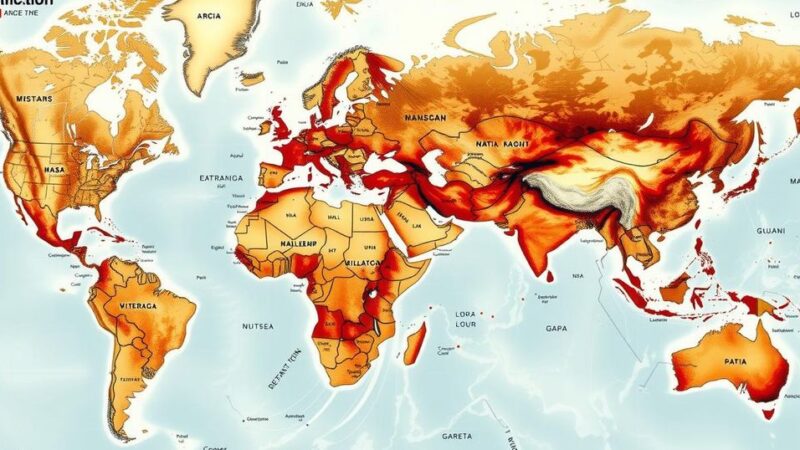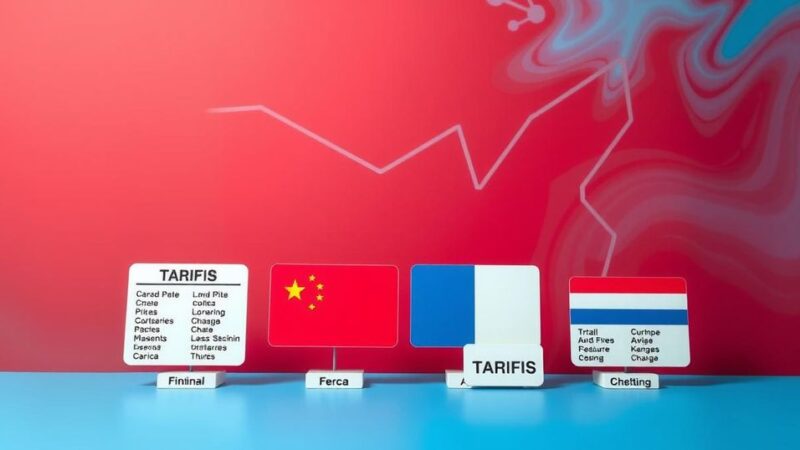North Korea vehemently condemned G7 demands to cease its nuclear program, claiming U.S. actions incite conflict. Pyongyang’s stockpile poses significant regional tensions, especially with U.S. troops in South Korea. The G7 emphasized compliance with UN resolutions, while North Korea accused them of hypocrisy regarding nuclear proliferation. U.S. strategic discussions with allies are aimed at countering North Korean advancements and preventing acknowledgment of its nuclear capabilities.
North Korea has responded vehemently to the Group of Seven (G7) nations’ call for the cessation of its nuclear weapons program, alleging that the United States and its allies are instigating nuclear conflict. This assertion reflects North Korea’s longstanding narrative, which cites U.S. actions as motivations for advancing their nuclear capabilities, a program recognized under United Nations sanctions.
Currently, North Korea is estimated to possess around 50 nuclear warheads, a significant source of strain in relations with South Korea, which hosts over 28,000 U.S. troops and enjoys the security benefits of the U.S. “nuclear umbrella.” The G7 accounts for approximately 30 percent of the global GDP, including three nuclear-armed states: the United States, the United Kingdom, and France.
During a recent G7 summit in Quebec, U.S. Secretary of State Marco Rubio and other foreign ministers addressed not only their efforts in ending Russia’s war but also geopolitical tensions in the Indo-Pacific region, particularly concerning relationships with China. The G7 reinforced its demand for North Korea to dismantle its nuclear arsenal and ballistic missile programs, emphasizing compliance with UN Security Council resolutions.
In a press release from North Korea’s Foreign Ministry, the G7 was accused of hypocrisy. “[…] The chief criminals wrecking global peace, security, and the international nuclear nonproliferation system are condemning the just war deterrence of a sovereign state—like a guilty party filing a lawsuit first,” the statement claimed. Additionally, the ministry reiterated that the U.S. is the only nation to have used nuclear weapons in conflict, accusing it of escalating tensions through military exercises conducted with South Korea.
The North Korean statement further criticized the United Kingdom for its partnership with the U.S. in nuclear submarine developments for Australia and alleged attempts to reintroduce U.S. nuclear weapons onto British soil. This was linked to reports suggesting a potential re-establishment of nuclear arms in the UK for the first time in two decades.
Moreover, French President Emmanuel Macron’s proposal to extend France’s nuclear protection to European allies was described by North Korea as a move toward increased European military autonomy. The G7’s actions were labeled as hostile nuclear proliferation disguised as “nuclear sharing” and “extended deterrence.”
The G7 also addressed cybersecurity threats from North Korean-linked hackers, indicating that their cryptocurrency thefts have reached approximately $1.2 billion, as reported by South Korean intelligence. There was also a condemnation of military cooperation between North Korea, Iran, and Russia.
In related commentary, Taehyun Kim from Korea National Defense University emphasized the need for the U.S. and South Korea to enhance deterrent measures against North Korea’s nuclear ambitions. He underscored that the evolving military ties between North Korea and Russia necessitate a strategic approach to deter any formal recognition of North Korea’s nuclear status by external powers.
Following these tensions, former U.S. President Donald Trump expressed openness to future dialogues with Kim Jong Un, stating, “I have a great relationship with Kim Jong Un, and we’ll see what happens, but certainly he’s a nuclear power.” This ongoing dialogue hints at the complexities surrounding North Korea’s position on the global stage.
The escalating tensions between North Korea and the G7 nations highlight the challenges of nuclear diplomacy. North Korea’s adamant defense of its nuclear program, in the face of international scrutiny, points to a broader geopolitical struggle influenced by U.S. military strategies and alliances. As global conversations continue, the need for cohesive diplomatic measures remains critical to preventing further escalation and fostering stability in the region.
Original Source: www.newsweek.com






